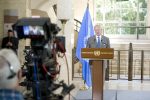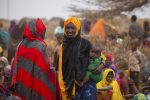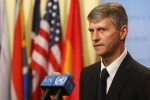The 2016’s humanitarian year was marked in May by a World Humanitarian Summit in Istanbul and, in September in New York, by a Summit on massive movements of migrants and refugees.
The international community is, as a matter of fact, faced with the greatest humanitarian needs of our time, most of them due to human causes … And the agencies of the United Nations system received only half of the funds they ask for. Given the increase of these needs, the complexity and the difficulty of the situations, the number of actors increases: Governments, UN, regional and subregional organizations, civil society, private economy, local communities, diasporas and religious organizations. To cope, all these actors must favor collaboration and complementarity, partnership and not competition, accept and seek diversity and not uniformity of responses to these humanitarian crises. And prioritize prevention, building resilience through links between emergency humanitarian aid and development assistance. And most importantly, do not forget the causes of these humanitarian crises and these massive movements of refugees and migrants, in most cases conflicts, civil wars or international conflicts… Read more »
|
















